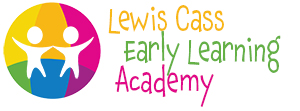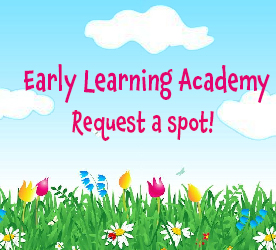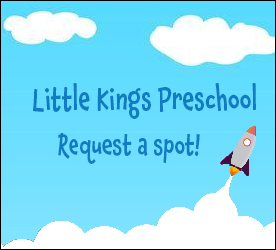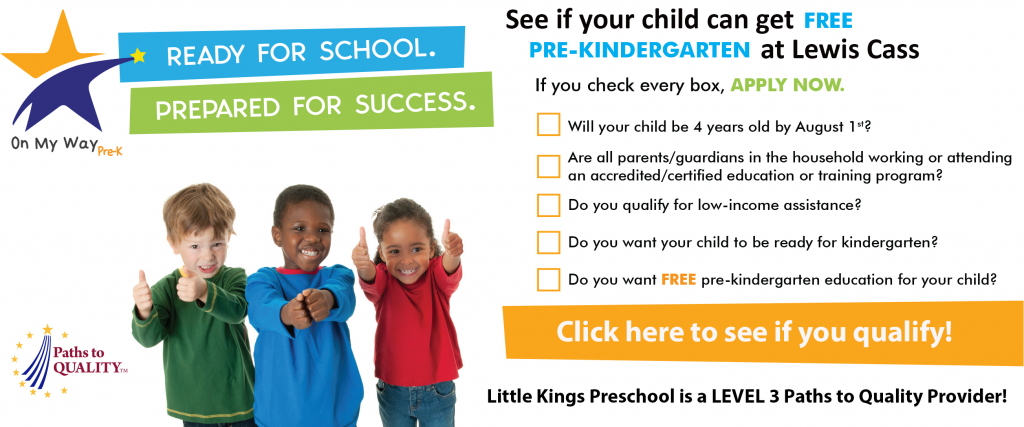Click here to request a spot for the 2025-2026 school year.
Program Information
Little Kings Preschool is a quality and affordable Preschool program that makes the transition to Kindergarten much easier. We offer full-day options that will help ensure your child is prepared and excited to learn. Students who are 3 or 4 years old by August 1st are eligible to enroll. Class is 8:15 am – 2:30 pm each day. Below are the class options we have available for the 25′-26′ school year.
*Monday & Tuesday half-day class for 3-year-olds! 8:15am-12pm
*Wednesday – Friday full-day class for 4-year-olds!
*Monday – Friday full-day class for 4-year-olds!
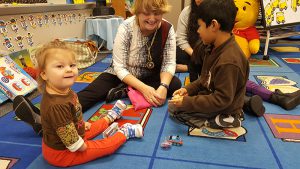
- Lunch is provided at a minimal additional cost or you may bring your lunch
- Special Education services are offered for qualifying students at no cost
Tuition Information
- Low monthly rate
- Scholarships available
- CCDF vouchers accepted
- On My Way Pre-K families accepted
Enrollment Information
* Please note that your registration is not complete until you have paid the registration fee and all paperwork has been turned in. Please be sure to complete all of the steps that are listed in the initial email that is sent to you or all the forms under Little Kings Preschool Forms . Once we have received all items, you will receive an enrollment confirmation email. *
2025-2026 Program Calendar
2025-2026 Parent Handbook
For more information:
- Call the Preschool at 574-626-3001
- Email us at earlylearning@lewiscass.net
Areas of Focus for a Successful Student at Lewis Cass Preschool
We will focus on five key areas: academics, arts, motor skills, relationships, and play while having FUN! All of these areas combined give your child the best pathway to success. Your child may be strong in some areas but need work in others. Our goal is for every student to be proficient in every area.
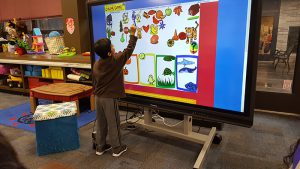
Art
 Art is an important part of your child’s early childhood education, regardless of whether you think he will grow up to be another Picasso. Children are active learners, and making art is a hands-on activity that expands imaginations and exercises creativity. It also develops fine motor control, eye-hand coordination, and sharpens children’s powers of observation.
Art is an important part of your child’s early childhood education, regardless of whether you think he will grow up to be another Picasso. Children are active learners, and making art is a hands-on activity that expands imaginations and exercises creativity. It also develops fine motor control, eye-hand coordination, and sharpens children’s powers of observation.Motor Skills
Just as gross motor skills enable your child to perform important everyday tasks, such as getting out of bed and going downstairs for breakfast, fine motor abilities allow for increasing independence in smaller but equally significant matters: opening doors, zipping zippers, brushing teeth, washing hands, and so on.
When combined with increasing hand-eye coordination, fine motor skills also open new doors to exploration, learning, and creative expression. In fact, research shows that emphasis on purely intellectual activities—memorization of letters and numbers, for instance—is far less useful at this stage than pursuits that encourage fine motor abilities and hand-eye coordination.
Relationships
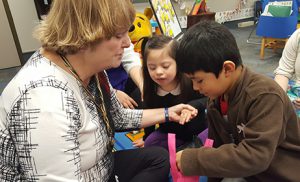 The connection between child and teacher is more important than any curriculum. This is what every parent knows by instinct: nice teachers matter, especially for very young children. This is the first time in many instances that your child will be away from you for any extended period of time. It is very important that these new adult relationships with a teacher be nurturing and positive.
The connection between child and teacher is more important than any curriculum. This is what every parent knows by instinct: nice teachers matter, especially for very young children. This is the first time in many instances that your child will be away from you for any extended period of time. It is very important that these new adult relationships with a teacher be nurturing and positive.
Play and have FUN!
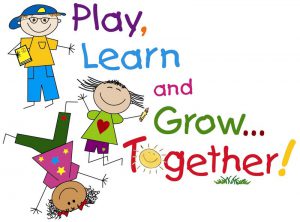 Most parents assume if there is a focus on ABCs and 123s, there is little room for play. Great preschools do both, and success in the early years of a child’s education often allows children opportunities to explore the building blocks of literacy and math through play.
Most parents assume if there is a focus on ABCs and 123s, there is little room for play. Great preschools do both, and success in the early years of a child’s education often allows children opportunities to explore the building blocks of literacy and math through play.
Other kinds of play are just essential as well. Imaginative play, for example. Some form of daily “pretend play” improves emotional/behavioral skills, which predict academic performance later. When you visit the school, look for a costume corner, art on the walls, pretend kitchen sets, and pairs or small groups of children working together creating and collaborating.
